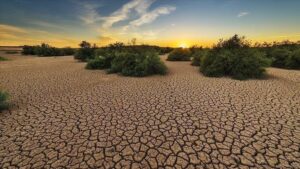In the Middle East and North Africa, water and food security is a pressing issue. It is harder to supply water and support agriculture in this region because most of its environments are arid. This is exacerbated by the region’s political instability and conflict, which can impact supply chains and further reduce access. Policy change, such as land reform, has been implemented in the region, but with varying levels of success. As governments are working to solve these problems, they must also face critical issues in the coming decades. These include water scarcity, water quality, population growth, and climate change.
Climate change is magnifying food and water scarcity in the region. This takes different shapes in different countries. The short film, “A Siege of Salt and Sand” by St.McNeil and Radhouane Addala focuses on climate change in Tunisia. Through interviews with locals and clips of widespread destruction, the film illustrates two causes of damage, the sea and the desert.
In two case studies shown in the film, Kerkennah and Djerba, rising sea levels are impacting the landscape. This affects food security by killing plant species and destroying the landscape. 65% of Kerkennah’s date palm trees have died from drought or sea encroachment. When the sea floods the land, its salinity dries out the roots of the palms and kills them. Rising sea levels are also predicted to divide Kerkennah into islets. Similarly, Djerba has faced 25-30 cm of sea level rise in the past few decades, which is projected to increase. This island risks the submersion of its shores if action is not taken.
Desertification is another threat to the country’s food security, destroying fertile land. Many valuable fertile areas are becoming arid because of hotter temperatures and sand encroachment. Sand covers fertile lands, preventing agricultural productivity and paralyzing economic development. It also attacks homes, schools, and roads, making daily life harder. 64% of Tunisia’s surface is threatened, leading most people to migrate to urban areas. In a region that struggles to maintain food and water security, climate change intensifies the problem while drawing away resources from food security and towards climate change mitigation.

Issam Jawadi, Carthage Magazine
Some points in the film that I found interesting were the actions citizens take to mitigate the effects of climate change, such as the building of sand walls and dunes. These walls act as barriers to stop sand encroachment without using many extra resources. Additionally, Tunisia became the third country to include climate change in its constitution passed in 2014. The constitution’s preamble mentions ensuring a sustainable environment for future generations. It is empowering that Tunisia is the third country to do this because it shows a commitment that many developed countries have not yet made.
Although the impacts of climate change are becoming more visible, most people tend to ignore it. However, in places like Tunisia, it cannot be ignored. Combining its arid landscape with climate change, environmental destruction is more potent. Not only does it magnify food and water insecurity, but it poses problems for all areas of life. The rest of the world should look to Tunisia as a warning and act to mitigate climate change.
Works cited:
“A Siege of Salt and Sand”. Directed by Sam McNeil, produced by Sam McNeil and Radhouane Addala, 2014.
Cammett, Diwan, Richards, & Waterbury. 2018. A Political Economy of the Middle East Fourth edition. Boulder, CO: Westview.
Ed Webb
October 9, 2023 — 2:06 pm
How meaningful is the constitutional provision in a state as resource-poor as Tunisia, do you think? Can it provide leverage for citizens to demand government action or is it largely symbolic?
barremar
October 11, 2023 — 1:50 pm
Although the constitutional provision may not produce environmental change/policy immediately, the fact that citizens and the government cared enough to include climate change in their constitution is a step in the right direction. The first step in solving a problem is recognizing that it exists, and this can provide citizens leverage to demand government action.
My concern with this, though, is that now that climate change is included in Tunisia’s constitution they will take fewer actions to mitigate it. Sometimes when an organization or the government does something to prevent climate change, they will continually reference that to show that they care, but stop taking further action because they don’t want to put more resources towards it. However, seeing how much climate change impacts the population, I don’t think Tunisia even has that option. It is affecting all areas of life, so Tunisians are forced to act.